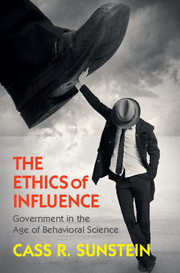Book contents
- Frontmatter
- Dedication
- Contents
- Acknowledgments
- 1 The Age of Behavioral Science
- 2 Choice and Its Architecture
- 3 “As Judged by Themselves”
- 4 Values
- 5 Fifty Shades of Manipulation
- 6 Do People Like Nudges? Empirical Findings
- 7 Green by Default? Ethical Challenges for Environmental Protection
- 8 Mandates
- A Very Brief Recapitulation
- Appendix A American Evaluations of Thirty-Four Nudges
- Appendix B Survey Questions
- Appendix C Executive Order 13707: Using Behavioral Science Insights to Better Serve the American People
- Index
8 - Mandates
Published online by Cambridge University Press: 05 June 2016
- Frontmatter
- Dedication
- Contents
- Acknowledgments
- 1 The Age of Behavioral Science
- 2 Choice and Its Architecture
- 3 “As Judged by Themselves”
- 4 Values
- 5 Fifty Shades of Manipulation
- 6 Do People Like Nudges? Empirical Findings
- 7 Green by Default? Ethical Challenges for Environmental Protection
- 8 Mandates
- A Very Brief Recapitulation
- Appendix A American Evaluations of Thirty-Four Nudges
- Appendix B Survey Questions
- Appendix C Executive Order 13707: Using Behavioral Science Insights to Better Serve the American People
- Index
Summary
Nudges preserve freedom of choice. But in light of behavioral findings, demonstrating the occasional human propensity to blunder, some people have been asking whether mandates and bans have a fresh justification, with a newly firm ethical foundation. The motivation for that question is clear: If we know that people's choices lead them in the wrong direction, why should we insist on freedom of choice? Is such freedom always in people's own interests? In the face of human errors, isn't it odd, or even perverse, to insist on that form of freedom? Isn't especially odd to do so if we know that in many contexts, people choose not to choose?
It should be agreed that if a mandate would clearly increase social welfare, there is a strong argument on its behalf. Of course we would have to specify what social welfare means, but if we can agree on a rough definition, we will find many cases where mandates make sense. Following Mill, we can see that the argument on their behalf is most secure when third parties are at risk. As we have seen, no one believes that nudges are a sufficient approach to the problem of violent crime. No one thinks that people get to choose whether to steal or to assault. We have also seen that in the face of a standard market failure, coercion has a familiar justification; consider the problem of air pollution. It is true that even in such contexts, nudges may have an important role; recall the possibility of default rules in favor of clean energy. But the effects of nudges, taken by themselves, might well prove too modest for the problem at hand, and they hardly exhaust the repertoire of appropriate responses. Mandates, incentives, and subsidies might turn out to be better.
We have seen that there are behavioral market failures as well. If people are suffering from unrealistic optimism, limited attention, or a problem of self-control, and if the result is a serious welfare loss for those people, there is an ethical argument for some kind of public response. When people are running high risks of mortality or otherwise ruining their lives, it might make sense to coerce them.
- Type
- Chapter
- Information
- The Ethics of InfluenceGovernment in the Age of Behavioral Science, pp. 187 - 198Publisher: Cambridge University PressPrint publication year: 2016



